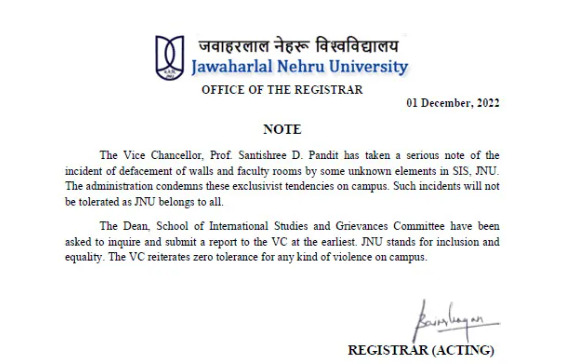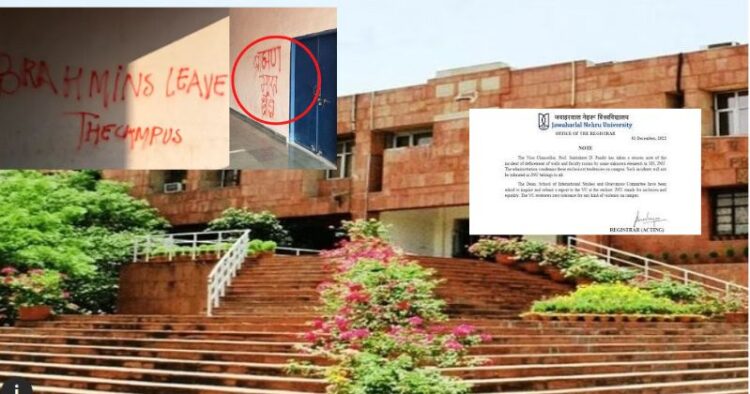In 2022, an incident occurred in the Jawaharlal Nehru University campus that involved inappropriately written slogans on the walls of the School of International Studies (II building). Jawaharlal Nehru University (JNU) is now entangled in a perplexing mystery as the university fails to identify who the perpetrators were behind this incident. In response to the RTI query raised by activist Vivek Pandey on this matter, the revelation was made by JNU authorities, first on February 15 and then on March 6, 2024. The university has acknowledged that it is still unaware of the culprits in this case even after 15 months. Some of the professors who were targeted by the culprits were Raj Yadav, Pravesh Kumar, Nalin Kumar Mohapatra, and Vandana Mishra.
JNU upholds principles of inclusion and equality. The Vice-Chancellor, Prof. Santishree D. Pandit, reaffirms that strict action against all forms of violence within the campus will be taken. This statement was officially endorsed by the acting Registrar also.

It was in 2022, JNU became the center of attraction when derogatory graffiti targeting the Brahmin community was visible on the walls inside campus. The incident sparked huge outrage and raised concerns about security and harmony on campus. Despite taking immediate actions to address and solve the issue, the university administration could not identify the people who were involved in the offensive act. Things like, “Brahmin bharat chhodo, go back to sakha, there will be blood etc.,” were written on the walls.
Thus, in his inquiry, Vivek Pandey mentioned 3 concerns:
1. Provide details on the person who identified these slogans inside JNU campus and punishment given to him
2. Details on actions taken against the people who raised anti brahmin slogans inside the campus
3. Details of the final status report of inquiry conducted by JNU
Challenges Faced By JNU
The absence of adequate surveillance infrastructure on campus has hindered the JNU’s ability to monitor and track down the culprits involved in the graffiti incident.Looking at the graffiti incident, it is clear that it was executed with a high level planning, leaving behind minimal clues for any possible investigations. Moreover, no eyewitnesses or credible leads have come up till date.
The failure of JNU to identify the perpetrators even after so many months has sparked disappointment and concern among students, faculty, and the public at large. It is being said that JNU’s inability to solve this high-profile incident indirectly throws light on its commitment to providing a safe and inclusive work environment for associated individuals.
Through the RTI disclosure, it has been observed that JNU needs to do a reassessment of campus security for future betterment. Students and faculty members are urging the JNU administration to invest in enhanced surveillance, improved lighting, and proactive measures to prevent similar incidents in the future.
Possible Course Of Action
JNU’s failure to resolve the December 2020 graffiti incident can have broader implications for its reputation. The inability to address such incidents promptly could discourage prospective students and damage the institution’s reputation in academic areas. Moreover, this incident also raised questions about communal harmony on the JNU campus. People who should take responsibility are shown as lacking accountability, which has created an atmosphere of mistrust and tension among different student groups.




















Comments